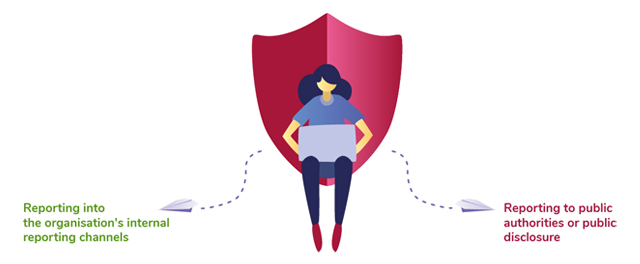
Author: Robert Nešpůrek
With the implementation deadline for the EU Directive on the protection of persons who report breaches of Union law (17 December 2021) approaching, here is a summary of the current state of the respective national measures in the Czech Republic and Slovakia and an introduction to our own whistleblowing solution: FairWhistle.
There is an implementing bill currently passing through Parliament which will, however, be delayed if not passed into law before the October parliamentary elections. Importantly, the current Czech draft act contains significant deviations from the Directive.
As regards material scope, not only breaches of Union law in the areas prescribed by the Directive are to be reported in the Czech Republic but also:
The draft bill also decreases the threshold of 50 workers prescribed by the Directive for entities in the private sector so that the law should apply to employers with more than 25 workers. In addition, it does not work with gradual adoption as in the Directive but prescribes a single mandatory deadline for all the obligated entities to set up an internal reporting system by 31 March 2022.
In Slovakia, there is already – since March 2019 – a law regulating whistleblowing. The Slovak government has, however, yet to propose a bill adjusting the current whistleblowing law to the Directive. From what we know, the plan is to pass an amendment to the standing law that would bring it in line with the Directive.
The law as it is today requires adjustments to comply with the Directive on several points, including who is to be regarded as a protected whistleblower and who are the other persons concerned, what would count as a retaliatory measure, the various timelines for processing reports and providing follow up to the whistleblower, or the proper setting up of an external whistleblowing channel. It does not look like Slovakia will meet the 17 December 2021 deadline for that amendment to take effect.
Although the Directive brings about a degree of uniformity across the EU block, it is likely that the Czech and Slovak local whistleblowing laws will differ and – as is customary in these latitudes – will also contain specific provisions going over and above the requirements of the Directive. Companies which already have in place whistleblowing schemes will need to reflect that and accommodate these differences.
One such example is the so-called “dedicated person” introduced by the Czech implementing bill. Reports may be channelled only to a dedicated natural person who receives and assesses the validity of a report, manages investigations and follow-ups and communicates with whistleblowers. Such person must be carefully selected and trained and their independence when dealing with reports must be ascertained.
We are following the legislative developments in both the Czech Republic and Slovakia closely and will inform you as it becomes clear when and how the Directive will finally be implemented in these jurisdictions.

In order to help our clients comply with the new regulations, we have designed a comprehensive solution for implementing and managing whistleblowing systems which we call FairWhistle.
We are ready to tailor the entire system (also in view of the fresh ISO 37002 guidance), select the right reporting channels, including a modern web platform from renowned technology partners, prepare all documentation, including appropriate internal communication and training, and then provide support in assessing and investigating reports and act as a “dedicated person”. The objective is to help our clients reduce risk and administrative burden, build ethical organizations and increase their reputation in the marketplace.
With FairWhistle we are capable of providing a tailored and seamless whistleblowing solution to a company of any size or structure. If you are considering how to become compliant with the new rules, do get in touch with us to discuss how best to suit your specific needs.